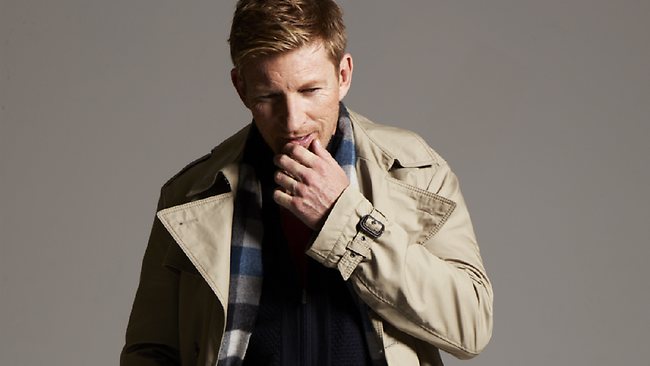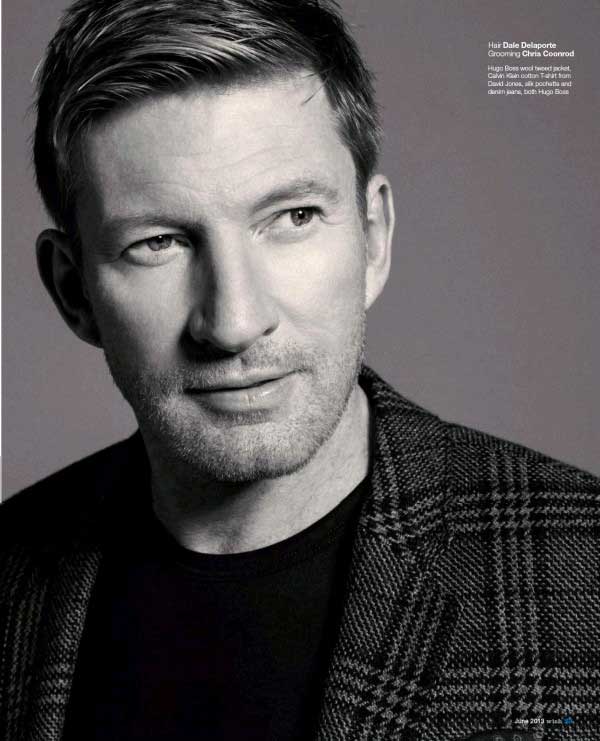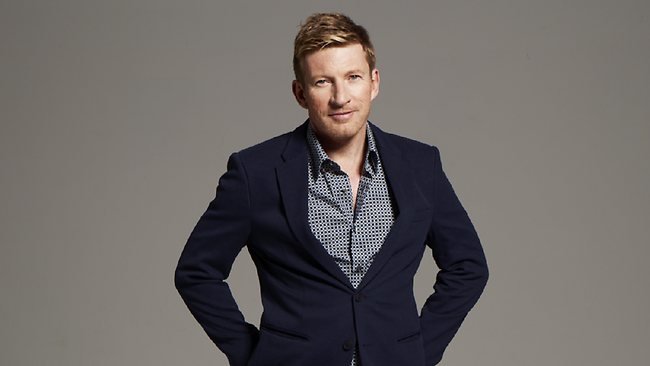DAVID Wenham admits that while he has a weakness for Burberry and Louis Vuitton he is not a big consumer of designer brands.
What the actor possesses, instead, is a fine appreciation of the language of clothing and the part played by costume in the delineation of character. The first thing he does, when attempting to animate a new role, is try on the character's shoes. "The way the shoes feel actually dictates how you walk," Wenham explains. "It's a completely different feel to the shoes you wear in everyday life."
Many times in his acting career, though particularly in the theatre where rehearsal time is longer, he has used costume to help him "find" the character. An extreme case is the Australian crime caper movie, Gettin' Square, filmed on the Gold Coast, in which he played the shambling small-time criminal, Johnny "Spit" Spiteri, a role for which Wenham won best actor at the AFI awards in 2003.
"I had a very clear image of the clothes I wanted the character to wear," he tells me, "and the only place I could find them was at a second-hand charity store on the Gold Coast. Some of them were located in the children's section, others in the women's. I managed to squeeze myself into a pair of second-hand women's jeans in that role because I wanted them to be slightly ill-fitting."
At the other end of the spectrum there are the roles in which the costume is so defined and stylised that there is no wardrobe wriggle-room for the actor. On the two occasions he has played big-hearted warriors - Faramir in The Lord of the Rings and Dilios in 300 - he had to "find a way into" character once the costume was given to him. He endured these constraints in the Tolkien film out of admiration for costume designer Ngila d*ckson, whose "work is completely gorgeous". But 300, a cross between swords and sandals, Ninja and splatter film directed by Zack Snyder and based loosely on the Battle of Thermopylae, presented a challenge of another order. "I used to come to work, get undressed, and spend the next 16 hours in a pair of leather underpants," he recalls. "That was an interesting spin on fashion".

This sensitivity to clothing codes extends to everyday life. The actor lives in the Sydney suburb of Potts Point with his long-time girlfriend and two daughters aged four and nine, and cherishes his part in their upbringing. But his roles as father, chauffeur, actor and red carpet star are perhaps the main reasons he finds himself changing clothes several times a day. "I'm pretty casual," he says. "But in the evening I enjoy suiting up."
One suit that he has worn recently, and for the first time, is of a professional rather than a sartorial nature: after an acting career spanning 25 years, David Wenham has just directed his first film. And the new suit fits, he finds, pretty well. On the day we speak he has just finished post-production on a short film called The Commission, about a father and son played by Hugo Weaving and Josh McConville, who meet at a mining settlement after many years apart. Shot near the iron ore town of Mount Gibson, 41/2 hours north east of Perth, it is part of an ensemble film produced by Robert Connolly involving 17 Australian directors - some, like Wenham, first timers - and based on Tim Winton's book of short stories, The Turning. "It was my first foray into direction and I loved it," he says. "I truly loved the whole experience."
Wenham is a devotee of Winton's spare, lyrical writing and keen sense of place but The Turning, he confesses, was the only one of the author's works he hadn't read. Connolly had explained early in the process that the choice of short story from the book was Wenham's alone, though he had suggested that The Commission might appeal. "He was right. I wrote the film adaptation and it is fairly faithful to the original source material. Not only can Winton perfectly capture the delicate unfolding of drama and bring a landscape to life with words, he has a reat ear for dialogue."
It was during one of his journeys along the Great Northern Highway to the set that he remembered working with Weaving on a stage production of an early Winton novel, That Eye the Sky, 20 years earlier. "The drive gave me time for reflection on a production that was a joy to be part of creatively and a piece that I think was both inspirational and moving. A couple of decades later, here we were again about to work on another Winton adaptation. This one certainly provoked me to think about all the turning points that have occurred in my life thus far."

Wenham's photo shoot and interview for WISH come at a crux moment in his career. The six-episode mystery, Top of the Lake, written and directed by Jane Campion and filmed amid New Zealand's stirring saw-toothed alpine scenery, has recently rolled out to critical acclaim, and in that series Wenham plays a somewhat ineffectual Queenstown police chief. He is soon to return to the theatre in a Melbourne Theatre Company production of Arthur Miller's The Crucible, as Massachusetts farmer John Proctor, a flawed hero and tragic victim of the 17th-century Salem witch-hunts. But there is more to his profession than delivering other people's lines. Over the past 12 months Wenham has written two screenplays and hopes to direct at least one by year's end, but for the moment he is keeping details of these fledgling works to himself.
In the meantime, his directorial debut gave him an appreciation for the "exponential" developments in recent years in camera and post-production technology. "I find myself in my mid-40s suddenly locating my inner nerd and becoming fascinated by the workings of these pieces of equipment and how they can be used."
When I suggest that he may have been on training wheels during the Winton project, his voice rises an octave and he offers a slightly shrill laugh: "I suppose you could put it like that, although having been involved in about 30 feature films, I don't know how many years of television, and having been an associate producer on a number of things, I've probably had more experience on a film set than a lot of directors." If there has been some slight he is quickly over it and in the next breath concedes that, in fact, he learned more directing The Commission than he thought possible. "It's been very instructive. Before I direct a feature film I'm glad that I directed something a little smaller first."
After a distinguished career in theatre and television, and on the cusp of his move into writing and direction, Wenham has seen the Australian film industry rise and fall. "When the dollar was lower there were thousands of people employed on film sets around Australia but those jobs have dried up completely," he laments. One distinctive change in his working life is the decline of in-house production, and here he notes his golden two years as Diver Dan on the 39-episode SeaChange: "The ABC technicians on that series are now all freelance." Another change is the fleeing of home-grown talent overseas. "I see more Australian actors and cameramen in Los Angeles than I do here. It's fantastic for them, but it would also be great to have more of those people working more often in Australia."
In the next few weeks, he heads to Melbourne for rehearsals of The Crucible. Written in 1953, the work is at once a fictionalised exploration of religious zealotry in colonial Massachusetts and a commentary on the anti-Communist hysteria of the McCarthy era. But Wenham believes that beyond its core thematic focus Miller's masterpiece illuminates more universal concerns with "morality that is black and white with no grey areas in between, and what you have to do to find who you really are". At the same time, he notes how Miller warned later in life that "he always knew a country was swinging to the right when The Crucible was about to be performed". The opening this month of the MTC production comes, significantly, just a few months before the federal election.
On the day we spoke, Wenham had already been photographed in a suitably brooding pose, wearing a dark pea coat, for an MTC poster to promote the play. But he had not seen costumes for the production, which are the remit of production designer Dale Ferguson. "I have already thought that my first conversation with Dale will, in fact, be about my shoes," he predicts. "My request will be that whatever style he has in mind, they be very weighty.
"Proctor is a man of the land and I want him to be a man with his feet planted firmly on the ground, literally. The weight of the shoes will also dictate that whatever movement the character makes is always deliberate. Hopefully, I can then begin to build up from the ground a character from a play that has to be one of the greatest written."

From here.